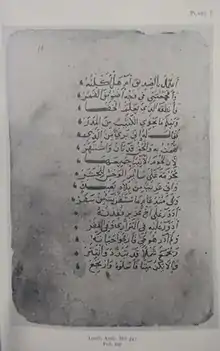The Story of Joseph in Arabic Verse
The Story of Joseph in Arabic Verse is the editorial title given to a poetic retelling of the story of Joseph the son of Jacob and Rachel based on the koranic account in sura 12 (Yusuf), the only instance in the Quran in which an entire chapter is devoted to a complete story of a prophet. The poem is in the tawīl metre and rhymes on -r. In its current fragmentary state, 469 lines (abyāt) survive. Its language suggests an origin in Egypt in the Middle Arabc period.[1][2][3] The poem is one of a large number of medieval retellings of the Joseph story across the Abrahamic religions, among them the fourteenth-century Turkish morality play about Joseph by Sheyyad Hamza.[4]
Manuscript

One manuscript of the poem is known, though the editors noted evidence of similar content in Cairo, Dār al-Kutub, MS Arabic: ج 9205, and speculated that 'it may contain the text of a poem similar to ours'.[1]:3
The manuscript is held the Brotherton Library of the University of Leeds as Department of Arabic, Islamic and Middle Eastern Studies MSS Collection, MS 347. In its present state, it comprises thirty-two, 15x10.5 cm folios, unbound. The text is extensively vocalised, with some rubrications, and laid out in single columns, fifteen lines per page. The folios are unbound and represent only part of the original MS. The editors speculate that it dates from the thirteenth or fourteenth century CE.[1][5]
Sample passage
In the following passage, lines 137-46, Jacob interrogates a wolf which Jacob's sons have captured and which they claim has eaten Joseph:
- Jacob addressed him: 'O wolf, by Him Who
- bestows death and life, and brings forth grain and dates,
- Knowest thou anything of the Truthful One, or hast thou eaten him,
- and caused grief to me over one whose face was brighter than the moon?'
- The the One Who knows what is hidden,
- and knows each grain [of sand] hidden in the sandhill, caused him to speak:
- 'I am innocent of that of which you accuse me;
- the truth has become clear and plain,
- Because the flesh of all prophets
- is forbidden to all wild beasts, to the Day of Resurrection.
- I am a stranger, from a far country,
- and I have had no rest from travelling for a year,
- Searching for a dear brother I have lost;
- I am seeking him in the deserts and the steppes,
- Not knowing whether he is alive, hoping to find him still living
- that we may be reunited after our long separation.
- But if he is dead, I must put him from my mind, and return
- with a sad heart, broken at our parting.
- I had no acquaintanceship with this country, yet
- as soon as I arrived they hunted me down.'[6]
Editions and translations
- The Story of Joseph in Arabic Verse in the Leeds Arabic Manuscript 347, ed. and trans. by R. Y. Ebied and M. J. L. Young, The Annual of Leeds University Oriental Society Supplement, 3 (Leiden: Brill, 1975), ISBN 9004041788 (with numerous emendations to the Arabic and corrections to the translation offered by A. F. L. Beeston, 'Notes on a Middle-Arabic "Joseph" Poem', Bulletin of the School of Oriental and African Studies, University of London, 40.2 (1977), 287-96).
References
- The Story of Joseph in Arabic Verse in the Leeds Arabic Manuscript 347, ed. and trans. by R. Y. Ebied and M. J. L. Young, The Annual of Leeds University Oriental Society Supplement, 3 (Leiden: Brill, 1975), ISBN 9004041788.
- A. F. L. Beeston, 'Notes on a Middle-Arabic "Joseph" Poem', Bulletin of the School of Oriental and African Studies, University of London, 40.2 (1977), 287-96.
- R. Y. Ebied and M. J. L. Young, 'An Unknown Arabic Poem on Joseph and his Brethren', Journal of the Royal Asiatic Society, 106.1 (January 1974), 2-7, doi:10.1017/S0035869X00131351.
- Sheyyad Hamza, The Story of Joseph: A Fourteenth-Century Turkish Morality Play, trans. by Bill Hickman (Syracuse, New York: Syracuse University Press, 2014), pp. 1-9, 27 fn. 14 ISBN 9780815633570.
- M. J. L. Young, The University of Leeds, Department of Semitic Studies, Catalogue of Oriental Manuscripts, VII. Arabic MSS 301-350 ([Leeds]: [The University of Leeds, Department of Semitic Studies], 1979), pp. 23-24.
- The Story of Joseph in Arabic Verse in the Leeds Arabic Manuscript 347, ed. and trans. by R. Y. Ebied and M. J. L. Young, The Annual of Leeds University Oriental Society Supplement, 3 (Leiden: Brill, 1975), ISBN 9004041788, p. 36. The final two lines are Beeston's recommended alternative to Ebied and Young's 'I have nothing to do with this country, save that | I came to it and they hunted me down; this is what happened': A. F. L. Beeston, 'Notes on a Middle-Arabic "Joseph" Poem', Bulletin of the School of Oriental and African Studies, University of London, 40.2 (1977), 287-96 (p. 93).
